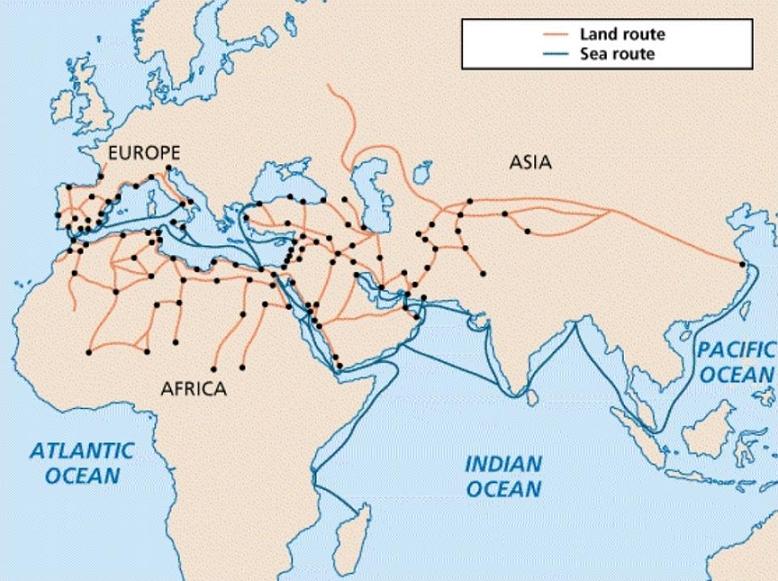Golden Web

July 4, 2017
Golden Web
Published 2002
 For at least one thousand years, Islam set astride the world’s great trade route known to historians as the “Golden Web.” This Golden Web route spread throughout the Middle East and was deemed one of the most lucrative. This route allowed gigantic trains of over sixty thousand people and as many animals to regularly arrive from China’s great cities and Central Asia to Eastern Europe. The route covers several major cities such as Samarkand and Bukhara and the Abbasid capital of Baghdad. The capital population then was about two million.
For at least one thousand years, Islam set astride the world’s great trade route known to historians as the “Golden Web.” This Golden Web route spread throughout the Middle East and was deemed one of the most lucrative. This route allowed gigantic trains of over sixty thousand people and as many animals to regularly arrive from China’s great cities and Central Asia to Eastern Europe. The route covers several major cities such as Samarkand and Bukhara and the Abbasid capital of Baghdad. The capital population then was about two million.
Muslims Trade Routes North Africa, Europe
The same goods would then be shipped to other destinations like Constantinople in Eastern Europe and south to Busra and Yemen from Baghdad. Yemen was a great source of spice and perfume. From Busra, the sea route to India and from there to the Indies. Finally, there was the trade route to Europe.
Muslims World Trade Routes
The influence of the Muslims was felt on the Southern fringes of Europe along the Mediterranean Sea. For example, in Southern France, in the town of Langouste Begeeni, there were Muslim settlements known to historians as Frahcenatum, not far from present-day Nice. Also, on the Italian coast, there were several small Muslim settlements along the coast. Anaglyph was best known among these cities because of the trading that was developed under Sicily’s Muslim rule.
Arabian Nights Legends 
The adventurous legends “Aladdin,” “Sinbad the Sailor,” and “Ali Baba.” (700-1200) are a direct reflection of the enormous culture of trade of the Golden Web and the importance of the two cities, Baghdad and Basra, to this maritime. These adventurous legends are only a few of the many Arabian Nights that were the main entertainment media then and continued to be so well into our modern times. Abbasid writers also developed new literary genres such as adab, the embodiment of sensible counsel, sometimes in the form of animal fables; a typical example is Kalilah wa-Dimnah, translated by Ibn al-Muqaffa’ from a Pahlavi version of an Indian work. Writers of this period also studied tribal traditions and wrote the first systematic Arabic grammar.
Recommended Posts

Women’s Rights to Own Property
January 20, 2018

Navigation
January 20, 2018

Algebra
July 4, 2017
Comments
Leave a Reply Cancel reply
This site uses Akismet to reduce spam. Learn how your comment data is processed.


These are truly fantastic ideas in about blogging.
You have touched some pleasant points here. Any way keep
up wrinting.
I am really impressed with your writing skills as smartly as with the format to your blog.
Is that this a paid subject or did you customize it your self?
Either way keep up the excellent high quality writing, it’s uncommon to look a nice blog like this one these
days..
Thanks a lot for providing individuals with such a splendid possiblity
to read critical reviews from this blog. It really is so lovely and
also full of amusement for me personally and my office mates to visit your website really 3 times
in 7 days to read through the fresh guidance you have got.
And definitely, we’re always fascinated with your amazing tips and hints you serve.
Some 2 areas in this article are unquestionably the most impressive we have had.
Lovely just what I was looking for. Thanks to the author for taking time on this
one.